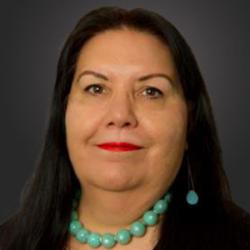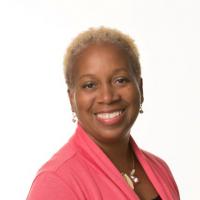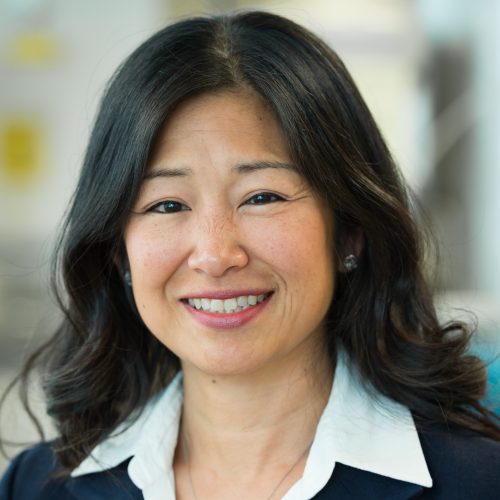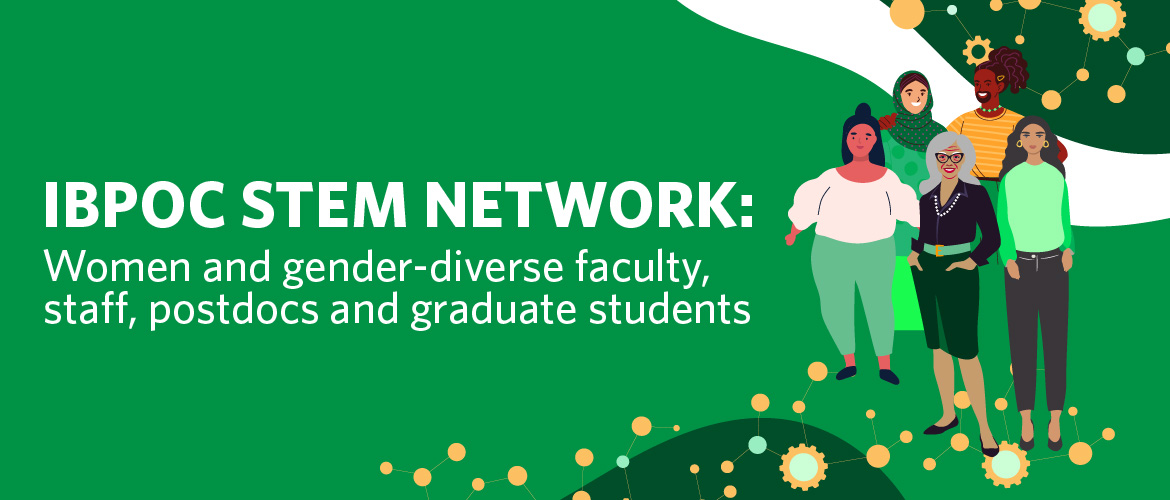
Are you an IBPOC woman (including cis and trans identities) or an IBPOC gender-diverse person in a Science, Technology, Engineering and Math (STEM) field at UBC Vancouver or UBC Okanagan? Join our networking series and build community with other IBPOC women and gender-diverse people. Faculty, staff, postdoctoral scholars and graduate students are welcome.
Overview
Within STEM, there are few faculty and staff who are IBPOC women or IBPOC gender-diverse people. As a result, trainees, junior faculty and staff, and even those in leadership roles who identify as belonging to these groups have very limited options in terms of getting empathic mentoring and support. This lack of support can lead to feelings of isolation, reduce a sense of belonging, and negatively impact retention. Non-tenured faculty may also feel unsafe asking other faculty and/or staff within their units for support as they may be involved in their performance reviews.
The IBPOC Women/Gender-Diverse Persons STEM Network is a response to these considerations as an affinity space for mentorship and support. Network programming is focused on enhancing wellbeing, cultivating a greater sense of belonging, building greater self-efficacy, supporting retention and initiatives that mobilize justice, equity, decolonization, Indigenization and inclusion within units.
Get Connected
If you are an IBPOC Woman or gender-diverse person in STEM from UBCO or UBCV, stay in the know and contact Hazita Harun (hharun@cs.ubc.ca) to join the UBC IBPOC STEM slack channel.
Upcoming events
- IBPOC STEM Network Spring Social
Date: March 2, 2023 3:00:pm
Location: Room X860, ICICS/CS Building - IBPOC STEM Network: Garden walk
Date: June 20, 2023 3:00:pm
Location: Nitobe Memorial Garden - IBPOC STEM Network summer social
Date: July 25, 2023 12:00:pm
Location: Great Dane Coffee
Past Sessions
Stories and Strategies from Women and Gender-Diverse Faculty, Staff and Trainees
Each session features a specific theme, and all IBPOC Women and gender-diverse persons (i.e. faculty, staff, postdoctoral fellows and graduate students) are invited. Sessions will include ice-breaker activities, informal discussions with panelists and an opportunity to ask questions.
The panelists are IBPOC woman or gender-diverse faculty members, staff or administrators from STEM fields at UBC or from nearby post-secondary institutions. They will speak about their personal and academic life trajectory as well as challenges they have faced and strategies to enhance their own success as an IBPOC woman or gender-diverse person in STEM.
Panelists for this session
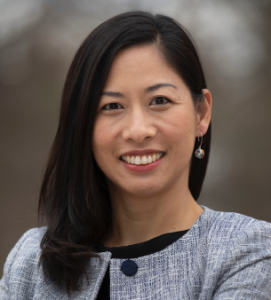
Maria Tokuyama is an Assistant Professor in Microbiology and Immunology at UBC.
Dr. Maria Tokuyama is an Assistant Professor in Microbiology and Immunology at UBC.
What is your current position and what do you do?
I’m an Assistant Professor in Microbiology and Immunology at UBC, Vancouver. My lab studies the interactions between viruses and the immune system and how these interactions shape health and disease. In particular, we study viral elements that are part of the human genome called endogenous retroviruses. We seek to uncover how these genomic viral elements modulate the immune system. Our goal is to identify novel targets of host-directed therapies to boost beneficial immune responses that will help fight pathogens and dampen detrimental responses that can cause chronic inflammation and disease.
Can you talk about where you're from, your community(ies), and where you find a sense of belonging?
I was born in Tokyo, Japan. I grew up mostly in Tokyo and southern California, but I also lived in the Netherlands for a few years and graduated high school from there. I obtained my bachelor’s from UC Irvine and Ph.D. from UC Berkeley, and then moved to New Haven, CT for my postdoc. I immigrated to Canada this year.
As I’ve moved around a lot in my life, the communities that I have identified with varied depending on the location. In Japan, I’m an ex-pat; in Irvine, I’m an Asian American; at Berkeley, I identified more as an immigrant; in New Haven, I started to embrace my Japanese identify with the birth of my daughter and identified with the Japanese community.
I’m still trying to find my community here in Vancouver, but I feel at home with those who are working really hard on JEDI. I feel a great sense of belonging amongst a community of people who deeply understand and can empathize with individuals who have been impacted by systemic injustice. Usually, this group consists of immigrants, minorities, marginalized folks and allies.
What are you passionate about, and why? How has this informed your research?
Scientifically, I’m passionate about understanding what determines heterogeneity in outcomes of viral infection and disease. Why do some people have mild symptoms to an infection, while others have severe, life-threatening outcomes to the same pathogen? Why do some people develop autoimmune diseases and others don’t, even within the same family? These questions are key drivers for what we study in my lab.
Beyond science, I’m passionate about creating a research enterprise where everyone has equal potential to thrive, regardless of their background. I have seen a lot of gatekeeping in academia that really hinders growth and success of scientists, especially those from marginalized groups. I would like to contribute to this effort by building a safe, open, and inclusive environment for students in my lab, training the next generation of scientists to have a firm JEDI mindset, and engaging with others at UBC and the broader scientific community to remove barriers and systematize JEDI into all aspects of science.
What are some of your career highlights? What makes you the most proud?
At the moment, my career highlight is landing this job. My younger self would've never imagined becoming a scientist, let alone a professor at a university. Growing up in a typical Japanese family from the 70’s and 80’s meant my prospects as a woman were to get a job for a few years after college, get married, have kids and be a home maker for a husband who has a steady job. Scientist, faculty, career, these were not part of that future. So I’m grateful for the opportunities that I have had and I’m proud that I’ve persisted and kept pursuing a career that gives me a lot of satisfaction.
I also feel proud when my students experience highs in research, whether through giving good presentations, landing a job they wanted, completing an experiment or having exciting data. I am also proud and empowered to be surrounded by other female scientists who are pushing boundaries and doing groundbreaking science.
Can you say a bit about what you do for fun? Or what’s something about you that most people might not expect?
For fun, I like to go hiking with my family, play games with friends (board games and card games), socialize over drinks and food, and eat dessert with my daughter. I also love a good meme.
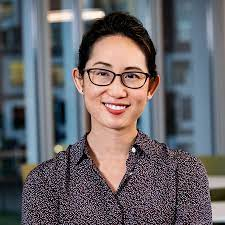
Rosalind Chow is a Professor of Organizational Behaviour and Theory at Carnegie Mellon University.
Dr. Rosalind Chow is a Professor of Organizational Behaviour and Theory at Carnegie Mellon University.
What is a brief description of what you do?
I study the power of social hierarchy and its impact on diversity and inclusion. Specifically I have a particular interest in how those at the top of social hierarchies understand their dominant position, and how they can use their position to advance the outcomes of those who have historically been disempowered.
When not conducting research or teaching students at the Tepper School, I serve as the Faculty Director of the Executive Leadership Academy, an innovative executive leadership program dedicated to the advancement of Black leadership talent through intentionally programmed professional sponsorship.
Can you talk about where you're from, your community(ies), and where you find a sense of belonging?
I grew up in San Diego, CA, and identify most strongly with the Asian-American community in the United States. Despite identifying with this group, I do not have a strong sense of belonging with this group for two reasons. 1) there are very few Asian-Americans in Pittsburgh (where I live) and 2) A significant part of my work deals with anti-Blackness. Anti-Blackness in the Chinese community is a real thing, and not something people are willing to talk about very much. I wish that Asian-Americans were more aware and appreciative of the important role that African-American activists have played in enabling the Asian American community to have the language and frameworks to organize against the recent rise in anti-Asian hate.
What are you passionate about, and why? How has this informed your research?
I am passionate about crafting situations that allow for people from different backgrounds and perspectives to create and build strong connections with one another. I believe that strong relationships are key to both personal thriving and mutual understanding. To the extent that I can help create those connections and relationships for others to have with one another, I derive great fulfillment from doing so.
What are some of your career highlights? What makes you the most proud?
I was the original faculty director for an executive leadership program focused specifically on the advancement of Black professionals in Pittsburgh. The program was designed to acknowledge the lived experience of these professionals and to give them tactical skills to navigate contexts where they face stereotyping and bias. It was also designed to create a strong sense of community between participants so that they would have the social support they need. The part that I am most proud of is that we pioneered a sponsorship component in the program that has been immensely impactful. I am now working on creating programming aimed at educating dominant/majority-group individuals on their role in structural inequity and helping them to create strong personal relationships with different-race/different-gender protégés, all in the service of helping them to become more effective sponsors for social equity.
Why did you decide to participate in the IBPOC Women's network?
As I mentioned above, I don’t feel particularly connected to any specific community. But given how passionate I am about social equity, this seems like it would be a good fit!
Can you say a bit about what you do for fun? Or, what’s something about you that most people might not expect?
Despite railing against gender stereotypes, I have depressingly gender stereotypical hobbies. I sew, garden, and support independent perfumery. But mostly, I don’t have hobbies because my two children are my hobby!
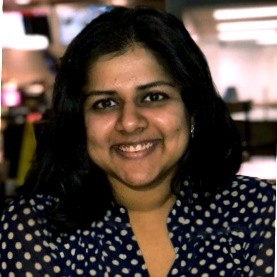
Sravya Paluri is a PhD. Candidate in the Department of Zoology at UBC.
Sravya Paluri is a PhD. Candidate in the department of Zoology at UBC.
What is your current position, title and brief description of what you do?
I am currently a PhD. Candidate at Dept of Zoology and I work part-time as a Senior TA for the course ‘Developmental Biology’. I work on understanding the formation and regulation of blood-brain-barrier formed by glial cells in nervous system of fruit flies.
Can you talk about where you're from, your community(ies), and where you find a sense of belonging?
I am from Mumbai, India where I grew up and pursed my undergraduate course. I then lived in Cologne, Germany to pursue my Master’s degree for two years. I have been living in Vancouver for the past five years to pursue my doctoral studies. I realized that my sense of belonging is torn between the India (where I spent my childhood) and my current life in Canada. I think this ’torn’ sense of belonging is a feeling that most immigrants would identify with.
What are you passionate about, and why? How has this informed your research?
I am very passionate about racism, sexism and inclusion of different communities. While my research is not directly related to this, I tried my best to contribute in my own way but getting involved with Equity, Diversity and Inclusion committee in my department. Currently living with a chronic illness, I am also very passionate about spreading awareness of it. I hope that in future I can also get involved in something that would make it easier for people with chronic illness to thrive in academia.
What are some of your career highlights? What makes you the most proud?
I was very happy to receive the 'J.N Tata Scholarship for study abroad’ to support my education in Germany. I was also happy to be the graduate student representative for Faculty Hiring in my department. Personally, I am grateful to have received immense support from my advisor, TA instructor and colleagues friends while facing multiple hurdles due to my chronic illness. This helped me stay determined to continue my studies here. What makes me feel proud is when I manage to get my undergraduate students look beyond their grades and actually get them excited about science!
Can you say a bit about what you do for fun? Or what’s something about you that most people might not expect?
I pursued a career in swimming when I was young (ages ago!). Currently I enjoy playing the ukulele to unwind after work.
Panelists for this session
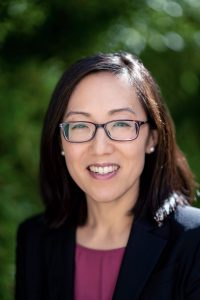
Amy Kim is an Associate Professor of Civil Engineering at UBC.
Amy Kim is an Associate Professor of Civil Engineering at UBC.
Can you talk about where you're from, your community(ies), and where you find a sense of belonging?
I grew up in Edmonton and Vancouver. My parents were immigrants from South Korea, who moved to Edmonton in the early 70s to attend graduate school.
The idea of community and belonging are interesting. I’m really not sure what my community is, but I do feel strongly about my identity as a Korean-Canadian. Also, my belonging has a lot to do with my career, which is a somewhat uncomfortable realization for me.
What are you passionate about, and why? How has this informed your research?
In terms of teaching and mentorship, I have felt strongly about supporting students of color (often from immigrant families), particularly those that are the first to attend university. The higher education and professional worlds can be uncomfortable and intimidating spaces for those unfamiliar with them.
My research mainly involves long distance transportation systems, which not only connect cities but also, remote communities. I’m interested in using my research to bring attention to the transportation accessibility of underserved communities.
What are some of your career highlights? What makes you the most proud?
I am most proud of my former students (undergraduate and graduate) who have carved paths for themselves in various fields related to transportation engineering and planning. It is great to see them develop confidence in themselves and the amazing things they have to offer.
Why did you decide to participate in the IBPOC Women's network?
Representation and mentorship are so critical for building confidence and gaining tools for success. I have thought about the mentorship elements I would have wanted as a young practicing engineer, student, and academic, and hope to help provide these resources and stay optimistic about the future.
Can you say a bit about what you do for fun? OR What’s something about you that most people might not expect?
I like hiking and skiing. I like looking at contemporary art; people have incredible ideas and means of expression.
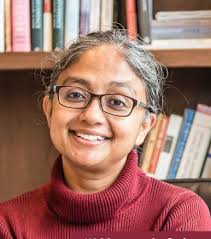
Malabika Pramanik is a Professor of Mathematics at UBC and the Scientific Director of Banff International Research Station.
Malabika Pramanik is a Professor of Mathematics at UBC and the Scientific Director of Banff International Research Station.
Can you talk about where you're from, your community(ies), and where you find a sense of belonging?
I was born and raised in a town called Hooghly in West Bengal, India. My neighbourhood consisted of extremely poor to lower middle-class families.
Even though the socio-economic variation was not huge, it was a right mix in other ways. Many of our neighbours had deep ancestral roots in the region, others were refugees displaced from Bangladesh because of the partition. There were different sects of Hinduism, a smaller number of Muslim and Christian families. Historically, my family's occupation was weaving saris, so I had a sneak peek into that art as well while growing up.
I find a sense of belonging in places of kindness where people are accepting, understanding and appreciative of others as they are.
What are you passionate about, and why? How has this informed your research?
I am passionate about mathematics, its ideas and its history. I am curious about the people who have contributed to it. I love to work on research problems, both on my own and with students and collaborators. The process of mathematical thinking, understanding what I don't know, internalizing the work of scholars who have worked on similar problems before me, trying to tease bits of sense out of an initially meaningless jumble - whether individually or alongside others - is an exhilarating one.
What are some of your career highlights? What makes you the most proud?
From 2014-2021, I was involved in a program called "Diversity in Math", first as an instructor (2014), then as a lead organizer (2016-2020), then in a supporting role (2021). The experience and insights I gained from organizing this program have been among the most rewarding in my professional journey.
Why did you decide to participate in the IBPOC Women's network?
I learnt about the IBPOC Women's Network from two of the most EDI-positive people I have met: Michelle Ng in UBC Computer Science and Mai Yasue at UBC's Equity Office. Michelle is a dear friend who has been a constant source of support and inspiration in all matters EDI. Mai, to put it simply, is irrepressible! If they are in, I am in.
What's something about you that most people might not expect?
I learned a classical Indian dance form called Kathak for many years; it was an important part of me when growing up. I still dance when nobody is looking!
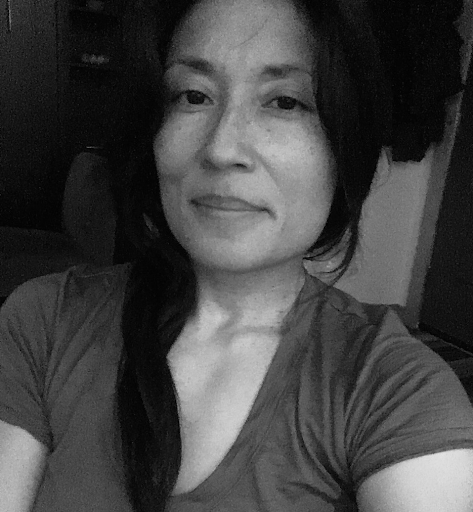
Michelle Montgomery is an Associate Professor in the School of Interdisciplinary Arts and Sciences in American Indian Studies and Ethnic at the University of Washington Tacoma.
Michelle Montgomery is an Associate Professor of Ethnic, Gender & Labor Studies, Vice Chair, Division of Social & Historical Studies, Assistant Director, Office of Undergraduate Education, Indigenous Community & Curriculum Advisor, School of Education, Adjunct Associate Professor, School of Medicine in the Department of Bioethics & Humanities - Interim Director, Undergraduate Studies and the Co-Coordinator & External Indigenous Advisor, UMN Morris Sustainable Leadership Program.
Can you talk about where you're from, your community(ies), and where you find a sense of belonging?
I am enrolled Haliwa Saponi/descendant Eastern Band Cherokee from Hollister, North Carolina - southeastern United States.
What are you passionate about, and why? How has this informed your research?
I am passionate about Indigenizing and decolonizing the climate justice narrative through the Indigenous Speaker Series, environmental ethics connected to Indigenous Peoples’ identities, and eco-critical race theory to eliminate racial and environmental oppression.
What are some of your career highlights? What makes you the most proud?
Michelle's career highlight are decolonizing and Indigenizing spaces through presentations, co-authored publications, and collaborative - heart work through the Indigenous Speaker Series and Rising Voices.
Why did you decide to participate in the IBPOC Women's network?
As a fluid mixed-race Indigenous woman, our (IBPOC) racialized academic lived experiences are grounded in a historical legacy of who defines for whom the meaning of science. It is important to participate in safe spaces to unapologetically ask the question — what does justice demand?
Can you say a bit about what you do for fun? What’s something about you that most people might not expect?
Most may not expect I have lived aboard — solo — on a 32" Catalina sailboat and prefer long trail runs in heavy rain.
Fun: rock climb, long trail runs, and sailing
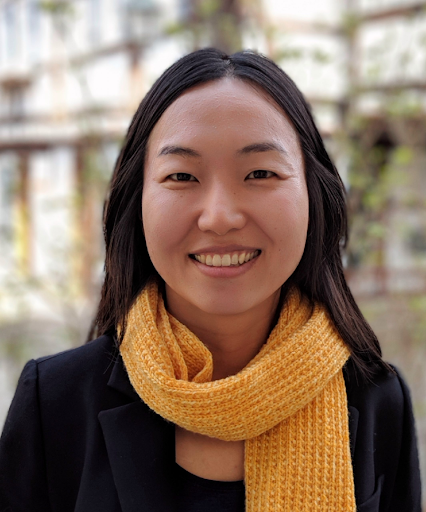
Mijung Park is an Associate Professor of Computer Science at UBC.
Mijung Park is an Assistant professor in the computer science department at UBC Vancouver.
Can you talk about where you're from, your community(ies), and where you find a sense of belonging?
I am originally from South Korea (hear my accent!). But I lived in the US, UK, The Netherlands, Germany, Austria, and now Canada. So I don't feel I belong anywhere in particular. World citizen.
What are you passionate about, and why? How has this informed your research?
I like to think about the privacy aspect of machine learning: how privacy is violated when data is processed/analyzed in a certain way and how to prevent it.
What are some of your career highlights? What makes you the proudest?
Some people might say spending three years as a postdoc is a waste of time, but I managed to make a transition during the postdoc years from neuroscience to privacy research. Sometimes I think I need my own time to do what I want to do, even if it might look long and unsuccessful from other's point of view (are you still doing a postdoc ??? — family and friends used to say).
Why did you decide to participate in the IBPOC Women's network?
Curiosity. I wanted to encourage women in STEM. I honestly don't feel I had enough encouragement and help from other female scientists until I came to UBC, where I get help from other female faculty members quite often. Maybe here I can also start helping out other female scientists.
Can you say a bit about what you do for fun? What’s something about you that most people might not expect?
I play with my kid (just turned 4). I bike with her. I dance with her. I go eat ice cream with her. We yell at each other at times, but mostly spending time with her is what I do for fun these days. Other than that, I occasionally play board games with new friends I made in Vancouver.

Nadia Joe works at UBC's Climate Emergency Hub.
Gä̀gala- ƛiƛetko (Nadia Joe) has spent the past 10 years working to support Indigenous communities across Canada advance their rights and interests in water security through various water co-management initiatives. She was raised by a river and loved into leadership by the many elders, leaders, mentors of the nłe?kepmx and southern Tutchone-Tlingit peoples. Her mother is nłe?kepmx and sylix and her father is southern-Tutchone & Tlingit. She belongs to the Crow Clan (Kä̀jet) of the Champagne and Aishihik First Nations. She is currently working at UBC’s newly established Climate Emergency team at the Sustainability Hub.
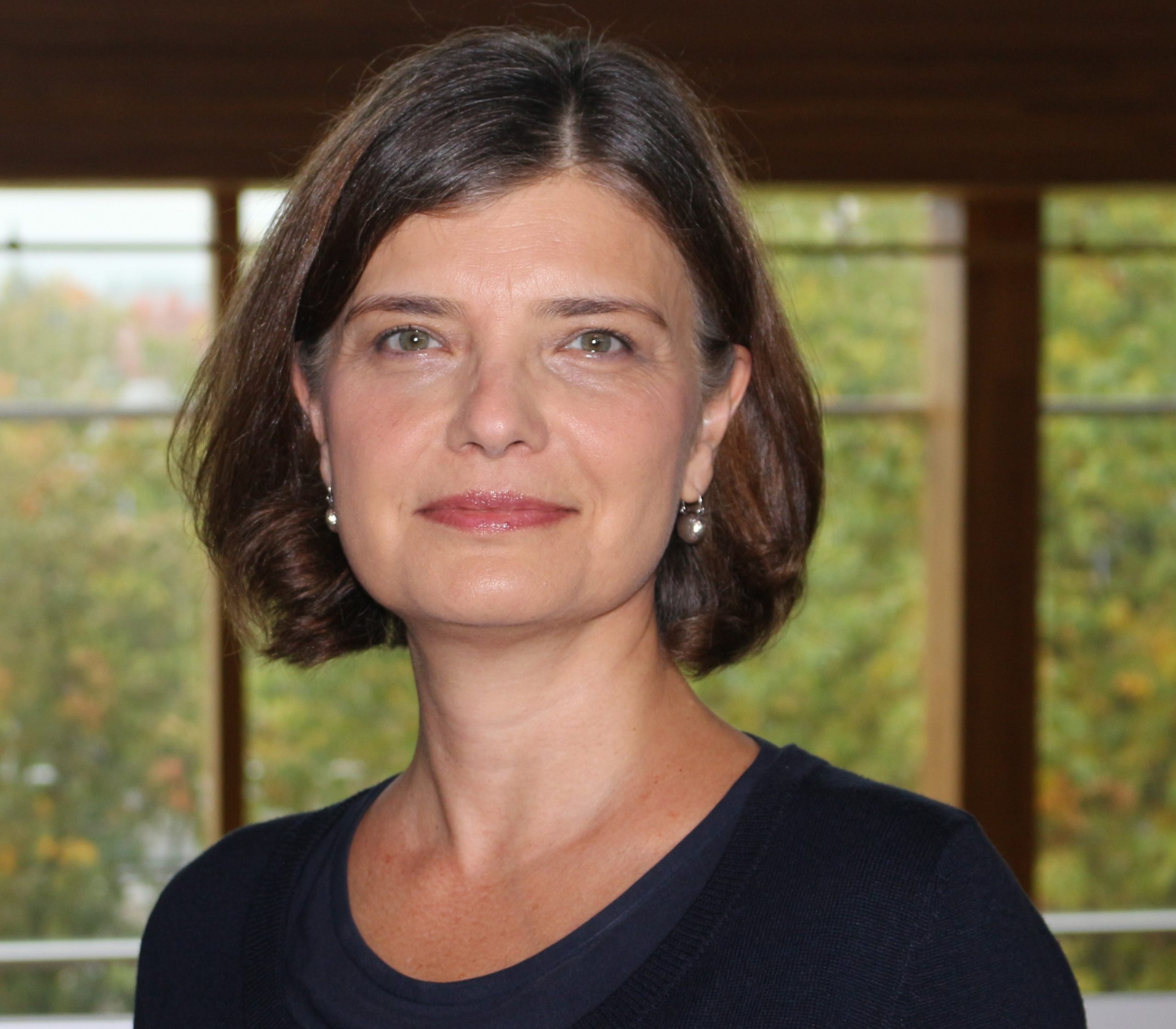
Gülnur Birol is the Director for Skylight at UBC.
Gülnor Birol Gülnur Birol, a mother of two adult children, was born and educated in Turkey. She has made three major career transitions over the years, covering disciplines in biotechnology, vision and science education. Gülnur received her B.Sc., M.Sc. and Ph.D. degrees in Chemical Engineering from Boğaziçi University, Istanbul. In 1997, she moved to Baton Rouge, LA, USA to work as a postdoctoral researcher at the Chemical Engineering Department of the Louisiana State University. After spending a year there, she accepted a position as a senior research associate at the Chemical and Environmental Engineering Department of Illinois Institute of Technology in Chicago, IL. She then accepted another position as a research assistant professor and a project leader for VaNTH Engineering Research Center and the Biomedical Engineering Department of Northwestern University, Evanston, IL. After immigrating to Canada in 2005, she took a job as a research associate with the Science Centre for Learning and Teaching (Skylight) and Biology Program at UBC. That role has led to other roles in Skylight, and she is currently the Director for Skylight.
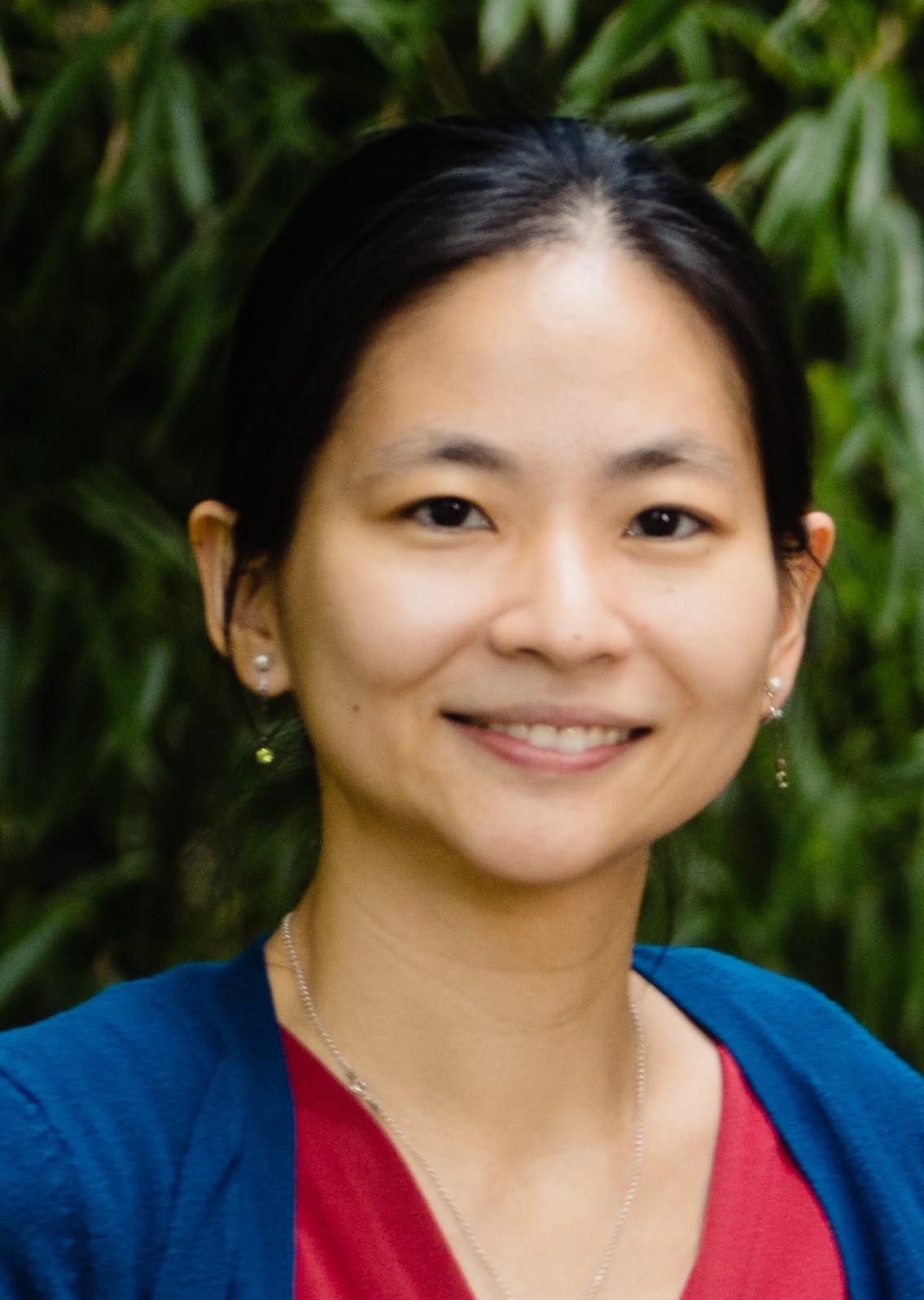
Theresa Liao is the Communications Coordinator for the Department of Physics & Astronomy at UBC.
Theresa Liao is the Communications Coordinator for the Department of Physics & Astronomy, University of British Columbia. She has more than 10 years of experience in science outreach and communication. These days, she is usually busy planning science conferences and public events, writing and editing research stories, hosting hands-on science workshops for kids, and managing the department’s website and social media channels.
Before her Science Communication career, Theresa studied biochemistry in undergraduate and completed her MSc in Experimental Medicine. Her research work focused on pancreatic progenitor cells and cell transplantation as a treatment for Type 1 Diabetes.
Hazita Harun
Hazita is a systems consultant with the department of computer science at the University of British Columbia. She has been working in the computer science department for over 21 years and works in a group of around 20 technical staff.
Majority of her responsibilities are:
- Managing the departmental virtual machine infrastructure;
- Implementing, managing and supporting various Linux operating systems
(Redhat, Ubuntu and openSUSE) for teaching, research area and/or department infrastructure.
Before working for the University of British Columbia, she worked at the Simon Fraser University (1994-2000). Earlier in her career, she worked for the Child Parent Resource Institute with the government of Ontario, and the University of Western Ontario.
Hazita has a Bachelor of Science (B.Sc.) in Computer Science from the University of Western Ontario.
One of the highlights of her career, as a UBC - USENIX Campus representative, was securing a USENIX diversity grant for a UBC female undergraduate student to attend USENIX conference.
Acknowledgements
Sarah Chen (Faculty of Science)
Mandy Khara (Pharmaceutical Sciences)
Melissa Lee (Statistics)
Stella Lee (Zoology)
Theresa Liao (Physics)
Dana-Lyn Mackenzie (App Sci/LFS)
Sasha McDowell (Zoology)
Michele Ng (Computer Science)
Maria Tokuyama (Microbiology)
Donna Seto (Civil Engineering)
Mai Yasue (Office of Respectful Environments, Equity, Diversity & Inclusion, Faculty of Medicine)
Funding for this initiative has been provided by the Equity and Inclusion Office and the following units in STEM - Botany, Civil Engineering, Computer Science, Faculty of Applied Science, Microbiology and Immunology, Physics, Statistics, Zoology and the Faculty of Pharmaceutical Sciences.
- Allen-Ramdial, S-A.A, Campbell, A.G. Reimagining the pipeline: advancing STEM diversity, persistence and success. 2014. BioScience 64: 612-618
- Hughes, B.E. 2018 Coming out in STEM: Factors affecting retention of sexual minority STEM students. Science Advances 4
- Petersen, S. , Pearson, B.Z, Moriarty, M.A. 2020 Amplifying voices: investigating a cross-institutional, mutual mentoring program for URM women in STEM. Innovative Higher Education 45:317-332
- Mickey, E.L. STEM Faculty Networks and Gender: A meta-analysis.
